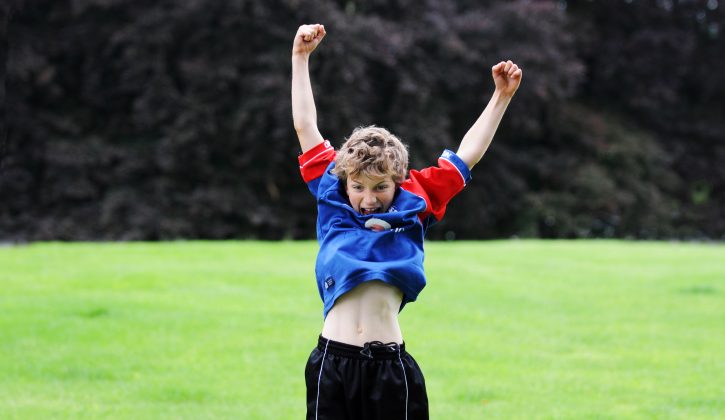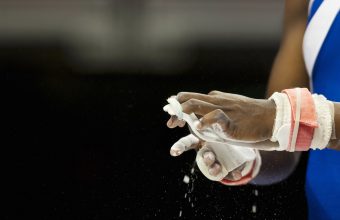Behind every star athlete stands their mom—their first cheerleader and coach. For two-time trampoline Olympian Rosie MacLennan, that person is mom Jane. She raised Rosie and her three athletic siblings with an ambitious, goal-oriented mentality. This mother-daughter duo shares their best tips for helping kids develop their own winning attitude, and how to deal with success and failure.
Open doors to opportunity
‘As a mother, your job is to open as many doors for your children, exposing them to a variety of opportunities. If a kid is a little reticent, don’t be afraid to give them a little push through,’ says Jane MacLennan, mom of four. Put them in a number of activities to help them find what they enjoy. That activity doesn’t need to be a sport—explore other arenas such as the arts and science.
Learn when to quit and when to stay
Jane’s four children have different personalities and by exploring multiple activities they discovered what they loved and loathed. ‘I had one rule: they had to finish the session of an activity they were enrolled in. If they weren’t enjoying themselves, then they could pull out when it was over,’ says Jane. Also, as a parent, be honest about intention. Whose idea is it to do ballet? ‘Some parents want their children to fulfill their dreams. But remember, kids have their own dreams and the drive needs to come from within them,’ says Jane.
Adapt a goal-striving attitude
An ongoing tradition that started with mom Jane’s generation during summers at the cottage was a program called ‘camp charts.’ Every day, each child has a list of activities and goals to work on, such as swimming, paddling, water skiing and diving. From toddler to teen, and beginner to intermediate, the goal is based on age and ability. Within this fun environment, every child is challenged and works at their level. At the dinner table, the kids tick off the milestone they achieved or task they completed that day.
Promote process-oriented activities
Make time for activities. This allows children the chance to work towards their goals. The cottage camp charts are less about competition and more about learning that every skill requires a process. No one is great at anything overnight or after one try. With this in mind, every cottage activity needs to be done three times for it to be considered complete. ‘This helped them learn that each person has to work through a number of stages to improve and execute a sport,’ says Jane. For example, when waterskiing, they had to get up on two skis, then stay up for a certain stretch, and learn how to turn.
Age is never a restriction
Being the youngest, smallest or biggest should never be a barrier. By 18 months, Rosie, who is the youngest of four siblings, wanted to water ski. So, her family made her mini skis to help her learn how to stand up.
Give them choices
‘Doing nothing is not an option,’ says Jane. It doesn’t have to be a sport, but they need to find a pastime. Rosie tried dance and music, too. ‘She liked the performance aspect of playing an instrument but she wasn’t very good at it,’ says Jane. Exposure helps them find what they’re passionate about and want to pursue.
Teach them how to fail
Sport is an important tool to help kids learn how to win graciously and how to deal with failure. They will need to deal with both in life, too. ‘During a ski race I hit a post and fell. I could’ve quit, but my mom was there and encouraged me to put the skis back on and finish the race,’ says Rosie.
Fail fast
‘Everyone fails, but the key is to learn how to fail fast. Learn from your mistake and move on quickly,’ says Rosie. ‘Mistakes are not a sign of failure. If you never fail, then you’re not learning. This is a necessary part of the learning curve. Your intention when competing is to advance, but whether you win or lose, life will go on,’ says Jane.
Compete with yourself
Competition is part of the game but don’t focus on competing against others, instead zone in on your performance. Set personal goals according to what you want to execute.
During the trials for Rio, Rosie focused on where she wasn’t instead of what she had to do to get to the top. Once she shifted her perspective, her performance improved. ‘Success is determined by what you put out there and what’s under your control,’ says Jane.
Teamwork
Never underestimate the power of teamwork outside of sport and within your support network. ‘When we had a family crisis with one of our children overseas, we came together, got on the phone and everyone had a role,’ says Jane. Use these game-time tactics to help problem solve.
Watch: The latest Procter & Gamble ‘Thank You, Mom’ video is a love letter to moms from athletes competing in the Summer Games. Rosie, who is also on the road to Rio echoes these sentiments, celebrating her mom’s strength and encouragement throughout her journey.
Tagged under: Parenting,Sports,athletics,Olympics,Road to Rio,raise an athlete
Category: parenting






